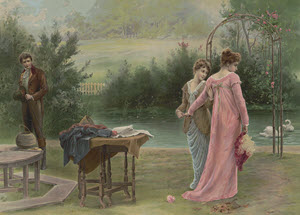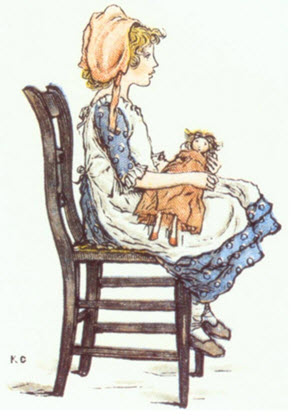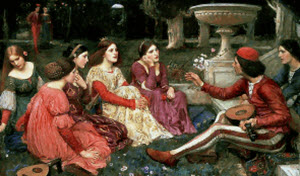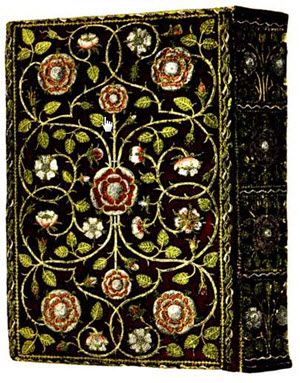EDGAR ALLAN POE - Part 26
The next day Virginia died. The story of their hardship is told once for all in Mrs. Gove's account of Virginia's bed of suffering.
" There was no clothing on the bed, which was only straw, but the snow-white counterpane and sheets. The weather was cold, and the sick lady had the dreadful chills that accompany the hectic fever of consumption. She lay on the straw bed, wrapped in her husband's great-coat with a large tortoise-shell cat in her bosom. The wonderful cat seemed conscious of her great usefulness. The coat and the cat were the sufferer's only means of warmth, except as her husband held her hands and her mother her feet."
The only surviving letter which Poe wrote to his wife is touching and genuine : -
June 12,1846.
" My dear Heart, - my dear Virginia,- Our mother will explain to you why I stay away from you this night. I trust the interview I am promised will result in some substantial good for me - for your dear sake and hers - keep up your heart in all hopefulness, and trust yet a little longer. On my last great disappointment I should have lost my courage but for you, my darling little wife. You are my greatest and only stimulus now to battle with this uncongenial, unsatisfactory and ungrateful life.
"I shall be with you to-morrow . . . P.M., and be assured that until I see you I will keep in loving remembrance your last words and your fervent prayer!
" Sleep well, and may God grant you a peaceful summer with your devoted Edgar."
After Virginia's death he was broken and irresponsible, and there were only two sane persons in his acquaintance to steady and support him, Mrs. Clemm and Mrs. Shew. Mrs. Shew had a physician's education, and she understood Poe's condition. She had a physician examine him as he slept, and they knew that the man had not many years to live. In her house Poe wrote the first draft of "The Bells." Unfortunately, he lost her more intimate help by clinging to her too closely, and she thought it wise to keep him at a distance. But she remained his friend.
Mrs. Shew advised Poe to marry a sensible woman, apparently with more eye to his happiness than to that of the woman. Poe in his broken, overwrought condition made two pitiful attempts to attach himself to women, but neither woman was notable for good sense.
The first was Mrs. Whitman, the poetess of Providence, Rhode Island. The story is rather complex, and the letters and printed recollections that re late and cross-relate it even scandal has failed to vitalize. The fantastic pair were guilty of nothing but lyric ecstasies and sentimentalities. It is a pity that this private business was ever opened it to the eye of the world, which, in point of fact, does not love lovers in their (crudest expressions of themselves. Real love letters are usually poor literature. If they are good literature, they are poor love letters. Poe and Mrs. Whit man did not make literature in their prose correspondence. The poems they interchanged and her defence of Poe published ten years after his death are tolerable. The rest might go into the fire along with Keats's letters to Fanny Brawne.
The story is, in brief, that Mrs. Whit man published verses to Poe. He fell in love with the idea of her, and played upon their common poetical superstition by sending her his verses "To Helen," which by momentous coincidence was her name! In the coincidence his prophetic soul saw, according to his own queer statement, the workings of the algebraic law of chance. In 1848 he met her, and pressed Ms suit. She re fused him on account of her age and ill health and his bad habits. He protested that his habits had been misrepresented, promised to reform, tried to kill himself: with laudanum, and finally persuaded her to accept him. He went to her house showing signs of having broker his pledge of abstinence, and she dismissed him with a final confession that she loved him.
Entangled with the story of Mrs. Whit man is that of his acquaintance with Mrs. Annie Richmond, of Lowell, to whom he wrote ardent letters. The reality of his feeling of kinship with " Annie " and his lack of a sense of fit ness are shown by the fact that, when he was engaged to marry Mrs. Elmira Eoyster Shelton, he wrote his mother-in-la^ that they must plan to be near " Annie," for he could not live without her. After Poe's death Mrs. Clemm spent sometime with " Annie."




